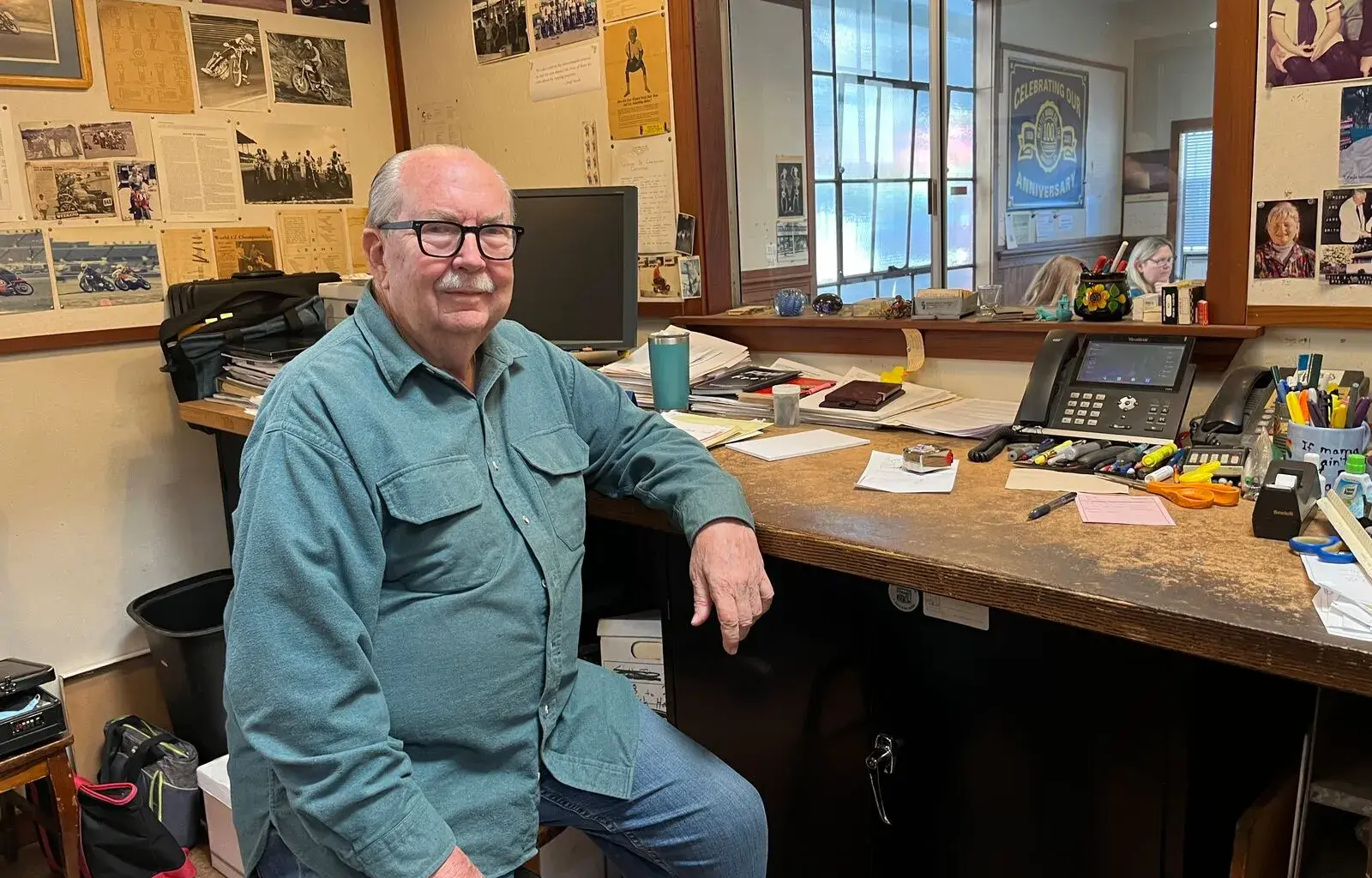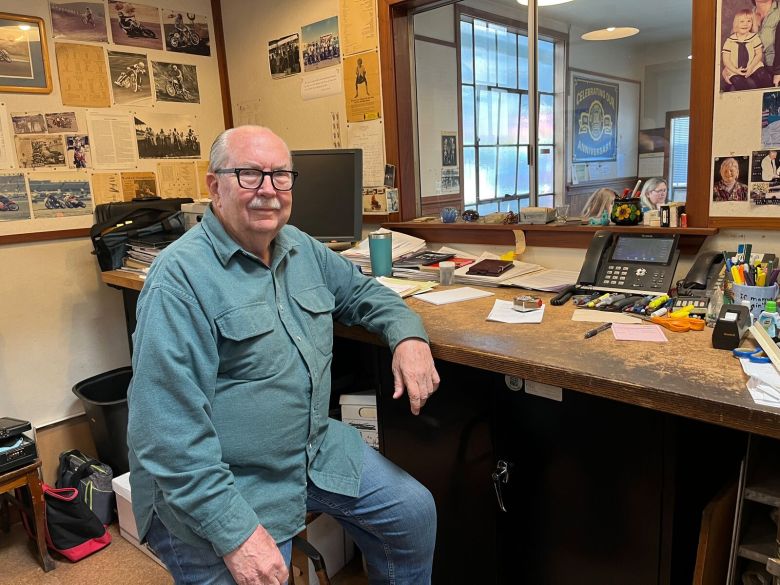 Owner Fred Mork, grandson of the founder, inside his office at the Walter Mork Company. Credit: Nathan Dalton
Owner Fred Mork, grandson of the founder, inside his office at the Walter Mork Company. Credit: Nathan Dalton
After 116 years in Berkeley, Walter Mork Company is closing its doors. The custom metal fabrication shop has survived two world wars, the Great Depression, and countless ups and downs in the economy. Twenty U.S. presidents have been elected since Walter Mork, a Finnish immigrant, opened the shop in West Berkeley in 1909. And four generations of the Mork family have worked there.
But it’s been hard for Walter Mork Company, and other old-school operations like it, to compete in the current age of metal fabrication, which is largely done with the aid of computers, the company’s leaders say.
“We’re basically state of the art, circa 1975,” said Berkeley Choate, the company’s vice president and stepson of owner Fred Mork.
For years, the company was able to “offset our technological deficiency with the talent of our people,” said Choate. But as its workers have aged out, and computers have gotten better at doing the complicated and arcane layout techniques the company is known for, the work has declined.
Fred Mork, grandson of founder Walter Mork, has been putting his own money into the business to keep it afloat, borrowing money from his retirement account and taking out various bank loans. The pandemic was tough.
“We’re not profitable,” Fred Mork said. “And I don’t see it changing.”
While a closing date has not yet been set, the plan is to close its Sixth Street shop sometime between December and February.
The closure is part of a larger decline of industrial manufacturing in West Berkeley, once home to more than 100 factories.
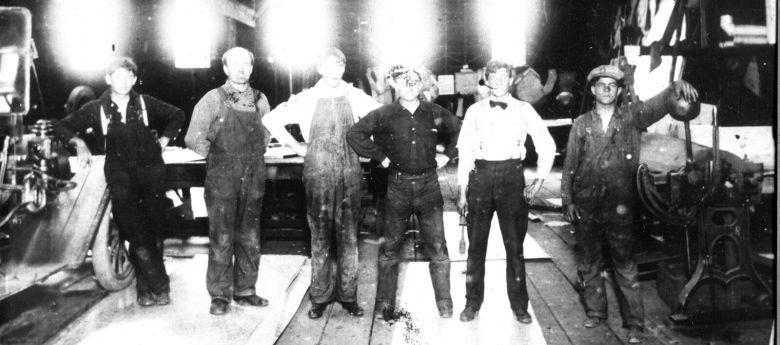 Walter Mork, second from left, at Dalziel’s Sheet Metal in San Francisco circa 1906, before the earthquake. Courtesy: Walter Mork Company
Walter Mork, second from left, at Dalziel’s Sheet Metal in San Francisco circa 1906, before the earthquake. Courtesy: Walter Mork Company
Walter Mork moved to Berkeley in the aftermath of the 1906 San Francisco earthquake, amid a population boom for the city as people fled the fire-ravaged city in search of jobs and housing, and dozens of factories went up in West Berkeley in just a few years. Mork had been employed as a sheet metal worker in San Francisco after having spent time in the logging industry of the North Country. Born in Helsinki, Finland, in 1881, he came to the U.S. through Ellis Island in 1902.
A large arch erected in 1924 at San Pablo and University avenues, once welcomed visitors to Berkeley and pointed the way west to the Manufacturing District. Fred Mork keeps a photo of the long-gone arch, which was located near his grandfather’s first shop, on the wall of the company’s office.
Charles Wollenberg, Berkeley’s historian, said it’s symbolic that new computerized manufacturing methods are a factor in the closure of the company.
“It’s an example of new technologies, often based on the research and engineering expertise of UC Berkeley faculty and grads, contributing to the decline and fall of Berkeley’s old industrial base,” he wrote in an email.
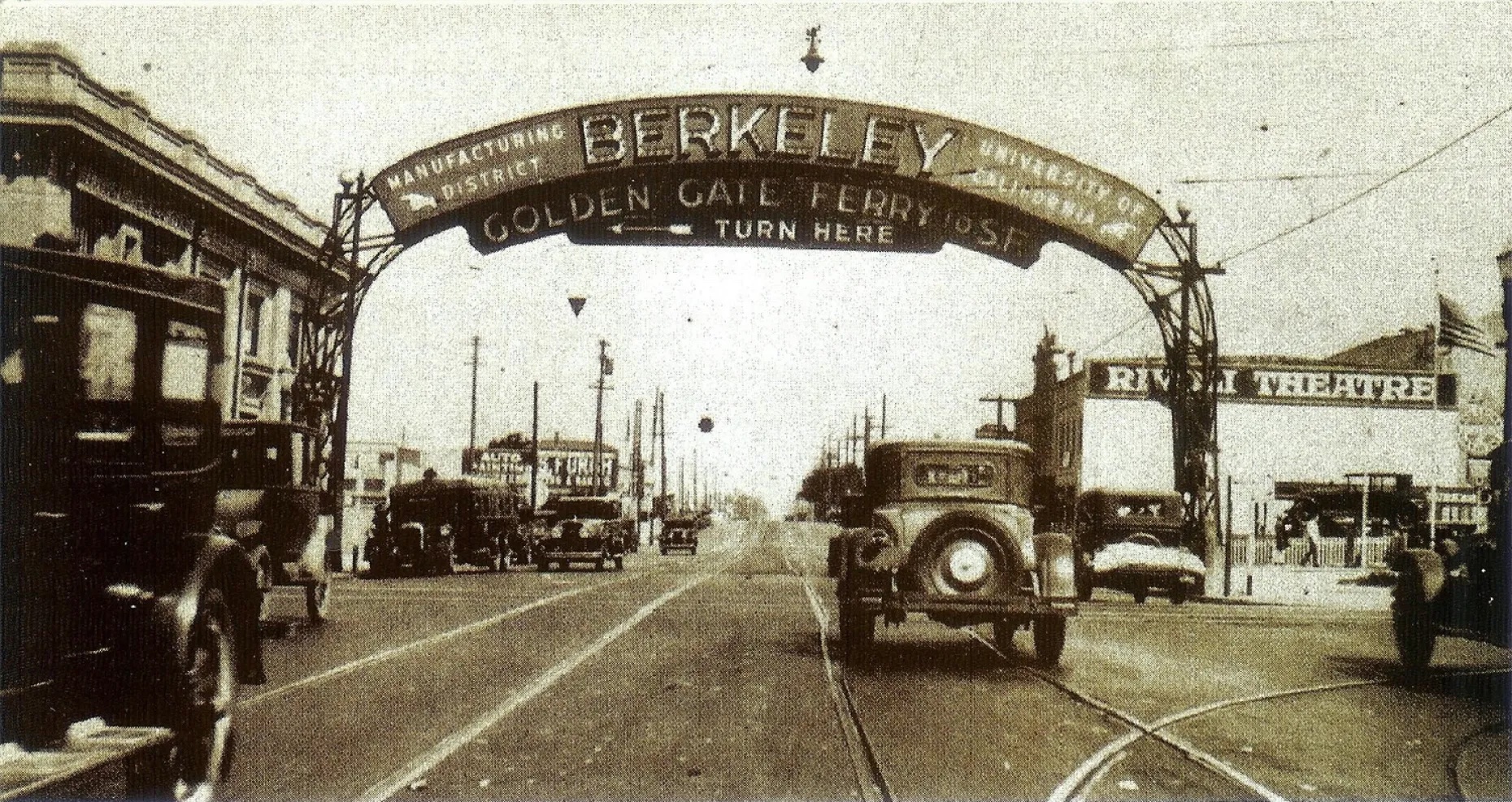 An arch built in 1924 pointed to West Berkeley’s manufacturing district. Credit: Berkeley Historical Society and Museum
An arch built in 1924 pointed to West Berkeley’s manufacturing district. Credit: Berkeley Historical Society and Museum
The Walter Mork Company currently has nine employees, the lowest it’s ever had, according to Fred Mork. The company is not able to offer severance packages to its employees, but will honor any unpaid sick days and vacation time that has accrued, and will continue its 401(k) match for employees until the business closes.
In the meantime, Mork is hoping to find another business that can lease the 15,000-square-foot shop, ideally, another metal fabricator that can make use of the company’s tooling, and also hire from Walter Mork’s pool of workers.
The Walter Mork Company is a time warp with a cult following
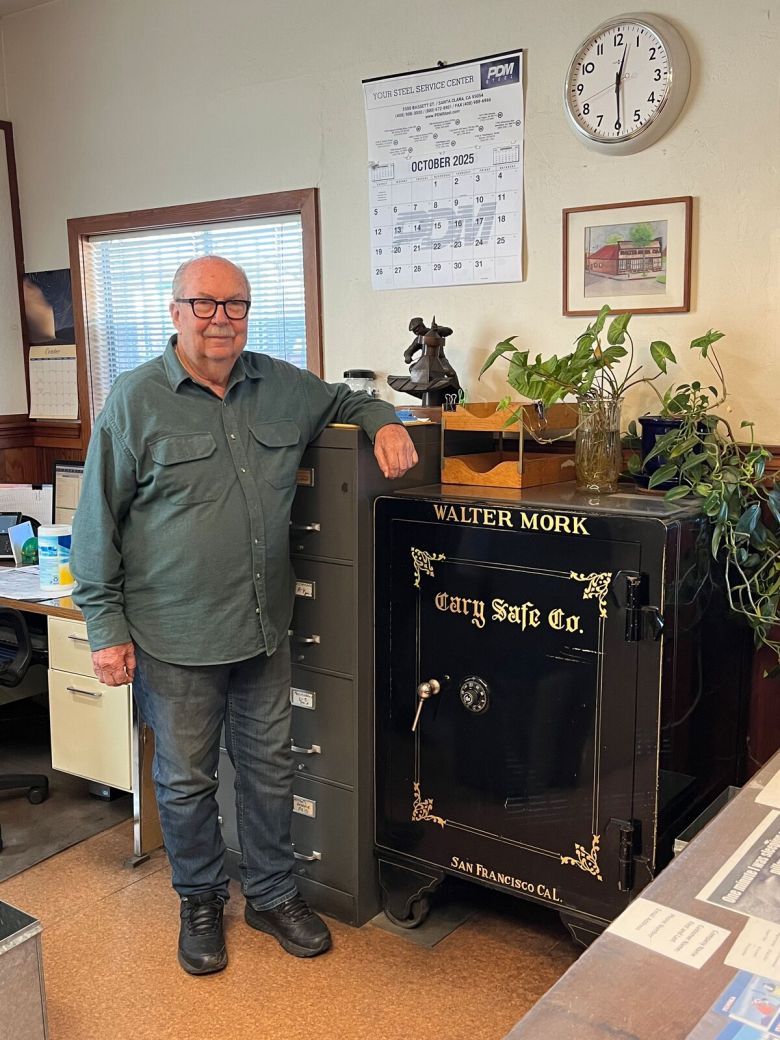 Fred Mork poses near an old safe inside Walter Mork Company’s office. Credit: Nathan Dalton
Fred Mork poses near an old safe inside Walter Mork Company’s office. Credit: Nathan Dalton
“It totally pains me,” said Fred Mork, who is currently 79. “I love the way of life. I love coming here. I mean this is my family.”
He doesn’t just mean his actual family members who work at the company, including a stepson, two daughters, and a sister-in-law. But also the generations of craftspeople who have worked at the company, and the loyal clientele that frequent the shop.
“We’re a sheet metal shop with a cult following,” said Fiona Mork, Fred’s daughter. “ People just walk in and they feel like it’s a time warp.”
Part of that time warp is the decades-old tools used in the shop, the carbon copy sales orders, the ancient safe in the office, the plans sketched on paper instead of computers. And then there’s the gallery of newspaper clippings and black-and-white photos that grace the office walls, telling the story of the company and its founder.
After landing in Berkeley in the wake of the San Francisco earthquake and fire, Walter Mork started his own company in 1909, because he was “not content to just be an employee,” according to his 1950 obituary in the Berkeley Gazette. Within a decade he outgrew his “little sheet metal shop,” according to the Gazette, and moved into a bigger space on Hearst Avenue, near San Pablo.
Mork was active in Finnish causes his entire life and played a large role in the community. He was elected to the Berkeley City Council 1923, serving for 26 years and was instrumental in building Aquatic Park. He was also an inventor, and held patents for a home gas furnace and a brooder for baby chicks.
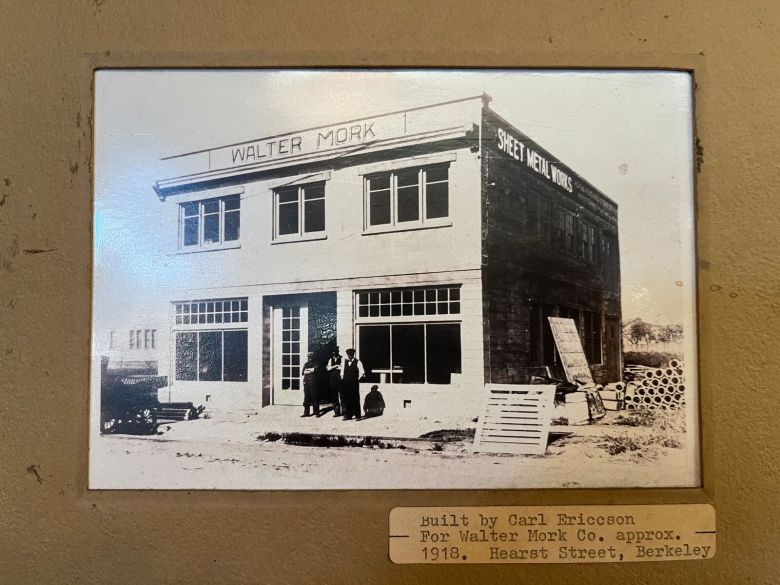 Walter Mork Company’s second location on Hearst Street. Courtesy: Walter Mork Company
Walter Mork Company’s second location on Hearst Street. Courtesy: Walter Mork Company
During World War II, the company was forced to shut down due to metal shortages, but Walter Mork Jr., who by this time had joined his father in the business, taught welding and metal fabrication at the Richmond shipyards “to the likes of Rosie the Riveter and her co-workers,” according to Choate.
Walter Jr. took the helm of the company after the war and moved the shop to University Avenue near Seventh Street. His sons, Fred and Bill, soon joined the team and took ownership when Walter Jr. died. The brothers moved the shop to its current Sixth Street location in the 1980s. Fred bought out Bill in the 1990s and brought on Choate, his stepson, to help run the business.
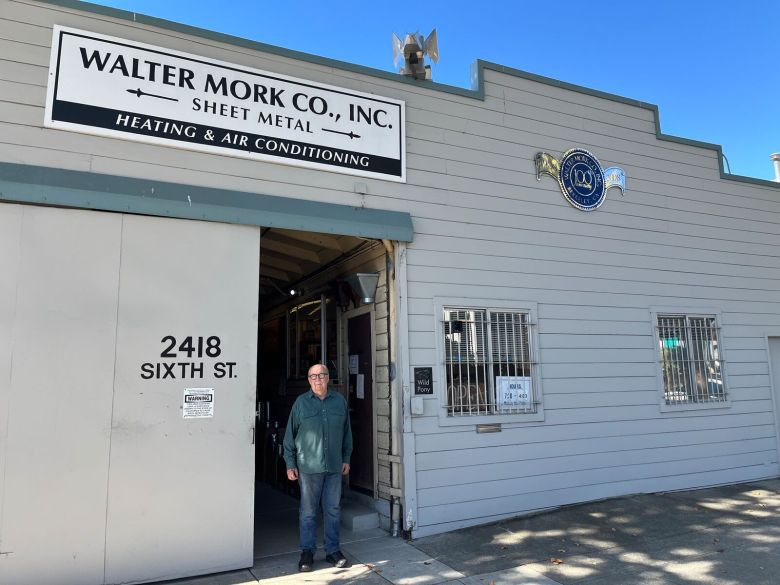 Walter Mork Company’s 15,000-square-foot shop on Sixth Street. Credit: Nathan Dalton
Walter Mork Company’s 15,000-square-foot shop on Sixth Street. Credit: Nathan Dalton
Over the years, the company has done thousands of jobs, large and small.
The company can fix a hole in your teapot, and also create ductwork big enough to drive a car through. It has done metal work for Bayer Laboratories, the Alaska Pipeline, the City of Berkeley, UC Berkeley, the Exploratorium, Lawrence Hall of Science, Market Hall in Oakland, Oliveto Restaurant, Chez Panisse, the Fourth Street Shops, and many more. And it’s done residential work for countless homes in the area, including fabricating kitchen countertops, railings, gates, awnings, gutters, trellises, furniture, hoods, chimneys and more. For years it also had a thriving HVAC department.
“What is a company about?” asked Choate, thinking of all the jobs over the years. “What is its soul? What is its intent and purpose? The community roots have always been part of what we’re about.”
As for the future, Fred Mork’s main plan is to stay healthy. He used to race motorcycles when he was younger. Due to balance issues, he can no longer ride. But he can still work on them.
“I’m constantly being inundated by people that want me to use my machinist skills and my fabrication skills and apply them to their motorcycle projects,” he said.
And until the business closes for good, he still plans to come in his usual four days a week.
“I look forward to every day,” he said. “I’ve been here for over 60 years, but there’s no other way I would choose to live.”
Walter Mork Company, 2418 Sixth St, Berkeley. Phone: (510) 845-0992. Hours: Monday-Friday, 7:30 a.m.-4 p.m. Connect via Instagram and Facebook.
We know that most readers don’t get to the end of the article. But you did! To support our in-depth, rock-solid reporting, please consider making a donation to our nonprofit newsroom today. We rely on our readers — particularly the ones who read the whole story!
“*” indicates required fields

